
Dist #8 candidate Samuel Dean will become just the second disabled representative in the Legislature if he wins.
MONROVIA, Liberia—If resilience were all that was needed to win election, Samuel Dean would win in a landslide. The 45-year-old, who is contesting the Montserrado County District #8 seat against sitting representative Acarous Moses Gray, has had an extraordinary journey—escaping wartime Liberia as a teenager, being shot by police in New York City and, finally, using his payout to help hundreds of Liberians with disabilities. Making it to the Liberian Legislature as just the second disabled representative would be another notch in his improbable story.
Though the war and crippled healthcare system have left a staggeringly high number of Liberians with disabilities, they have had almost no political representation to date. There is no recent reliable data on how many Liberians are disabled. Just 12,399 registered as disabled with the National Elections Commission, but it’s likely far higher. A 2008 Housing Population Survey found 14 percent were disabled. As the population ages, Daintowon Pay-Bayee, Chairperson of the National Commission on Disabilities, said the number may be as high as one in every five or more than a million people.
The 2005 National Commission on Disability Act calls for three Legislature seats to be reserved for persons with disabilities, but it has never been implemented. Rosanna Shaack of River Cess County became the first disabled person elected to office in 2017. She is running again this year.
Dean says he is running for disabled Liberians and all Liberians who have been left out by those in power.
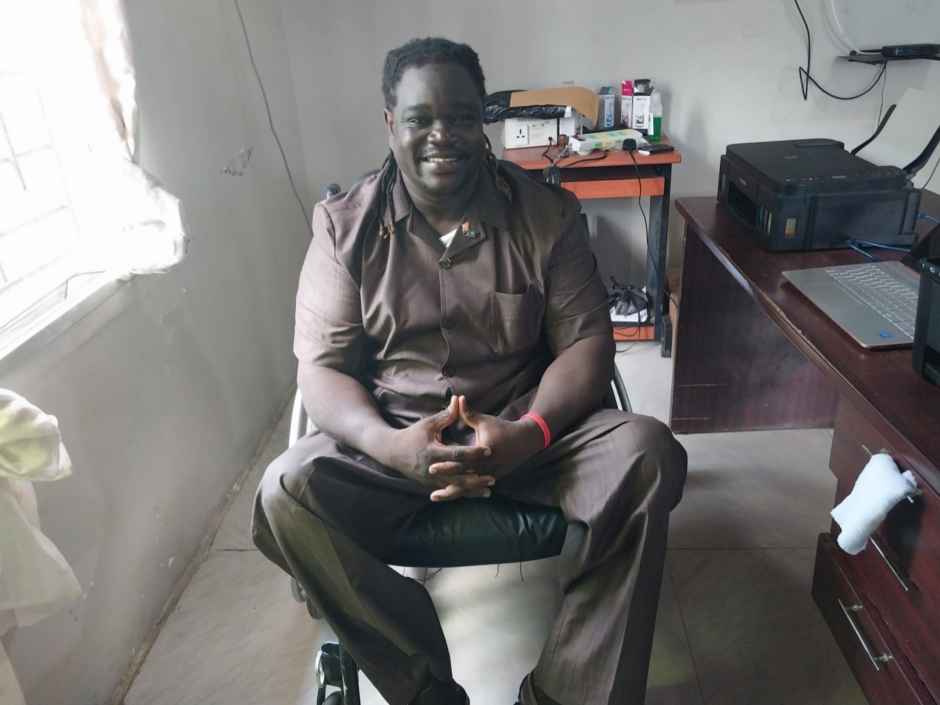
Dean in his office in Sinkor.
Dean was born in 1977 in Liberia and in 1998 fled the war to the United States as a teenage refugee. But after escaping the violence of Liberia, it caught up with him in the U.S. Dean had been living with extended family in the large Liberian diaspora community in the New York borough of Staten Island for a year. He was working at the fast-food chain Kentucky Fried Chicken and studying for his high school diploma when he became a victim of an all-too-common American tragedy.
“When I came home from work, I decided to visit a friend, right opposite my uncle’s building,” Dean recalls. “While giving my particulars to the security lady assigned at the desk at the apartment building, I was approached by what seemed to me a homeless man. He told me that I was under arrest. And because America is so crazy with every Tom, Dick, and Harry owning a weapon, I froze. Next thing you know, I got gunned down with multiple bullets, right at the security desk.”
Dean lost his spleen, left kidney and small intestine. He was left a paraplegic, paralyzed from the waist down. His doctor told him he was lucky to be alive. It turned out the man was a White undercover police officer who had mistaken Dean for someone else.
“[He] shot me for no other reasons than that I was black. I would find out later that an Italian-American undercover police officer called Arnold was the shooter. Arnold has yet to apologize for trying to destroy my life.”
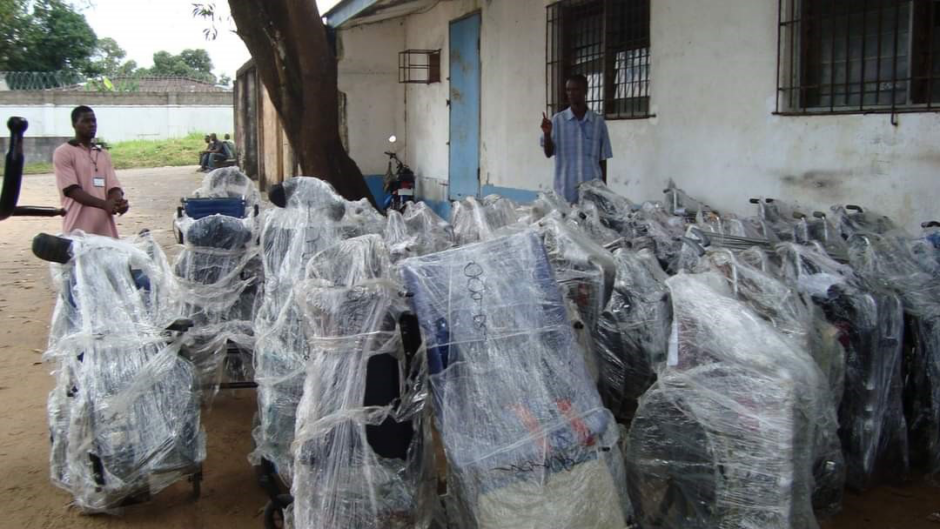
Wheelchairs Dean said he provided to an institution in his district in 2008.
Dean says he sued the New York Police Department and won a large payout. He claims to have used $US5 million of that to change the lives of thousands of disabled Liberians by giving them their first crutches, walkers, canes, wheelchairs and adjustments to make their homes more accessible. It was not possible to verify that claim, but Dean shares photographs showing hundreds of pieces of equipment going to various places in Liberia, including at a disabled institution in his district. “Before this intervention they only lay on the floor,” Dean says. Other photos show equipment being donated at JFK, Bomi, Lofa, the Antoinette Tubman Cheshire Home and a deaf institute.
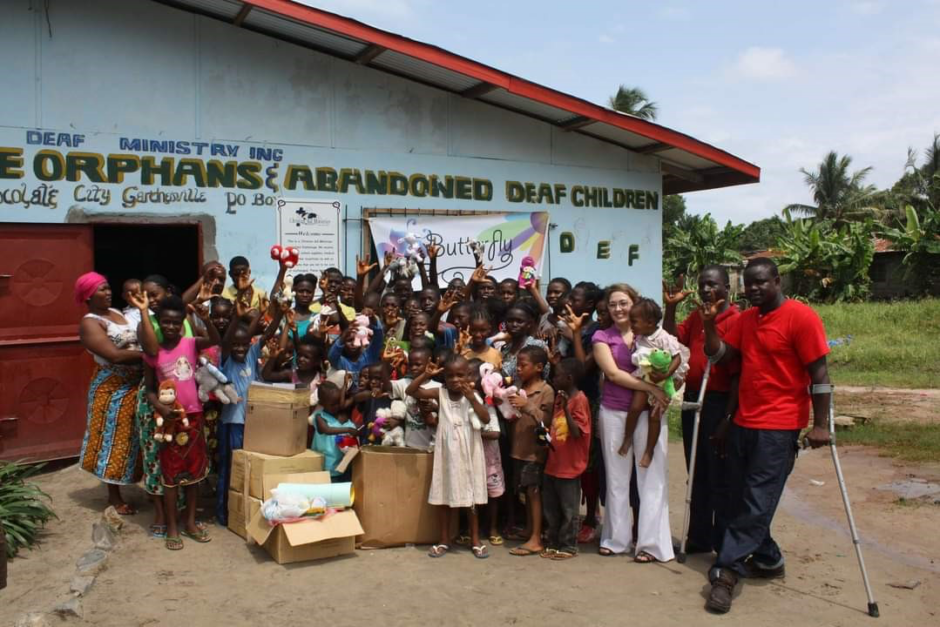
Dean poses for a photo with beneficiaries of his humanitarian gesture.
Dean describes this outcome of his tragedy – being able to change the lives of so many people – as a gift. “My accident was a blessing in disguise,” he says. “They meant it for evil, but He [God] meant it for good. Talk about turning adversity into opportunity! I’m humbled and honored to have been used as the conduit to end the plight of thousands of Liberians with disabilities and put smiles on the faces of them and their families.”
Dean left America, which has far better services for disabled people, for good in 2016 to “emancipate his people from poverty to prosperity through advocacy, lawmaking and oversight as a statesman in the Legislature” he says. He graduated from the Mother Pattern College of Health Sciences in Monrovia in 2023 with a degree in social work. Dean compared the treatment of people in the U.S., where disabled people are getting financial support with Liberia where, “it’s a social sanction stigma. They treat us like fifth class citizens.” Dean’s says his inspiration for better living conditions for members of his community came from the 1990 American Disability Act.
He quotes President George H.W. Bush signing the act into law, “Let this shameful wall of discrimination come tumbling down.”
Life for Liberians with disabilities has been extremely difficult. Schools are rarely accessible for children with physical disabilities and visual impairment. School books and teaching materials are not adapted for them. Roads, transport, buildings are rarely adapted to cater for disabilities.
“When you even growing up as a child people look at you and tell you, your cripple self, you don’t even have right to a name,” says Daintowon Pay-Bayee, Executive Director of the National Commission on Disabilities, a government agency devoted to the welfare and well-being of persons with disabilities, a woman with disability.
Even the Legislature itself has no adaptations for people with disabilities. Representative Shaack, who uses devices to aid her walking, is forced to climb stairs in the building. There is no way for wheelchair bound people to lobby or visit lawmakers.
Representative Shaack did not answer numerous text messages asking for comments for this story. Some disability activists have been critical of her failure to bring more funds and support to them. Disability advocates have high hopes that Dean will bring big changes if he makes it to the House.
“We are looking for somebody that will go on the floor to push issues that matter to persons with disabilities,” says Peter Flomo, President of the National Union of Organizations of the Disabled. “Samuel Dean got the courage and, you know, now in our Liberian setting, we get people that discriminate. I want to say, kudos to honorable Samuel Dean.”
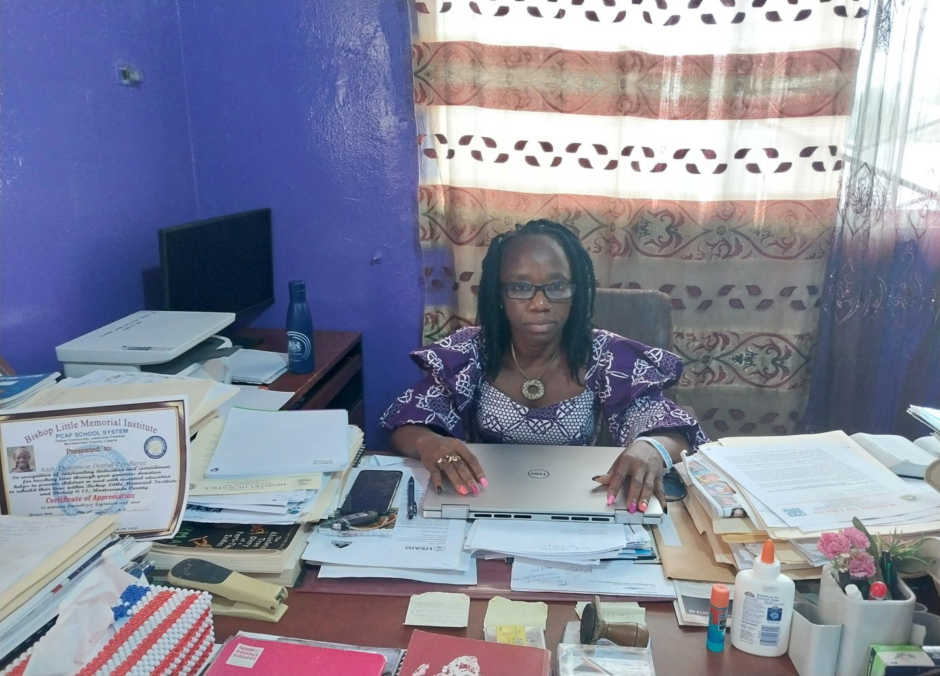
Daintowon Pay-Bayee, Executive Director of the National Commission on Disabilities.
National Commission on Disabilities head Pay-Bayee, says she admires Dean’s courage to overcome the challenges and run for office.
“For people with disabilities to put these things aside and face their fear, for me, I think it’s very awesome, “says Pay-Bayee, in an interview with NN at her Congo Town office. “We have always supported people with disabilities and we will always support people with disabilities and whatever it is that I have to do to realize this I will. We want to see how the number [of disabled representatives] can increase.”
If elected Dean says he will legislate policies that will prioritize the livelihood of disabled people through proper budgetary allocations that would put disabled people and all disadvantaged Liberians on a level playing field. He promises to address education and equal access with people within his society, youth employment with much focus on ‘at risk youth’, health care, social welfare, disaster relief and others. He says he will provide free education for residents of his district and promised to prevail on every corporate business to provide 50 percent of jobs for the youths in District #8.
He has big promises for his district.
“I’m going to introduce a social welfare program and get our mothers that always begging for a cup of rice to get at least half a 25 kg bag of rice and US$50, and free health care,” says Dean, who gets around his district in a wheelchair. “I don’t have to tell you to look any further than to see blind in the ensuing traffic looking for their daily bread,” he says. “That has to be history. It doesn’t matter whether I’m a person with a disability. I’m a person with exceptionality who understands the issue. I’m here to make a difference because I’m a change agent.”
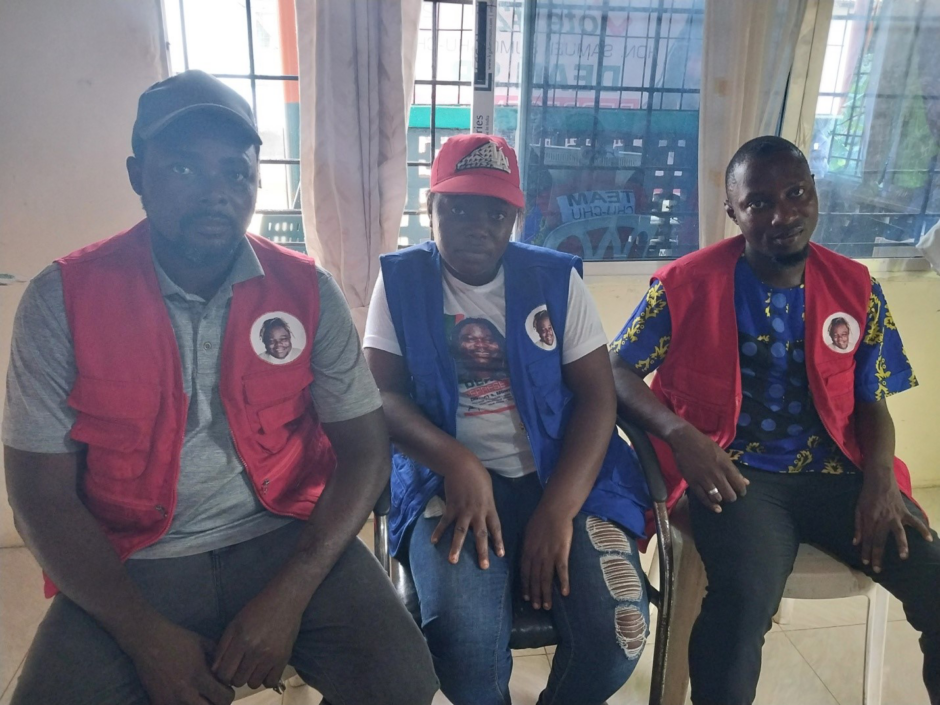
Dean’s political campaign team wears his regalia. Credit: Varney Dukuly/New Narratives/FPA.
Dean’s campaign team, not disabled, says it sees in him, a champion for all Liberians.
“He is the best person that my heart desire, because I feel when he goes in that house, he will do better for our children,” says Patience Batuah.
This story was a collaboration with New Narratives as part of the Investigating Liberia project. Funding was provided by the Swedish Embassy in Liberia. The funder had no say in the story’s content.
